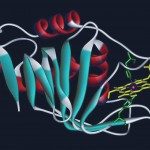Lien vers Pubmed [PMID] – 22192750
Med Sci (Paris) 2011 Dec;27(12):1106-11
Protein phosphatase 2A (PP2A) is a large family of holoenzymes that comprises 1% of total cellular proteins and accounts for the majority of Ser/Thr phosphatase activity in eukaryotic cells. PP2A proteins are made of a core dimer, composed of a catalytic (C) subunit and a structural (A) subunit, in association with a third variable -regulatory (B) subunit. Although initially considered as a constitutive housekeeping enzyme, PP2A is indeed highly regulated by post-translational modifications of its catalytic subunit or by the identity of a regulatory type B subunit, which determines substrate specificity, subcellular localization and enzymatic activity of a defined holoenzyme. During the two last decades, multiple studies of structural and functional regulation of PP2A holoenzymes by viral proteins led to the identification of critical pathways for both viral biology and tumorigenesis. To date a dozen of different viruses (ADN/ARN or retrovirus) have been identified that encode viral proteins associated to PP2A. In this review, we analyze a biological strategy, used by various viruses based on the targeting of PP2A enzymes by viral proteins, in order to specifically deregulate cellular pathways of their hosts. The impact of such PP2A targeting for biomedical search, and in further therapeutic developments against cancer, will also be discussed.

